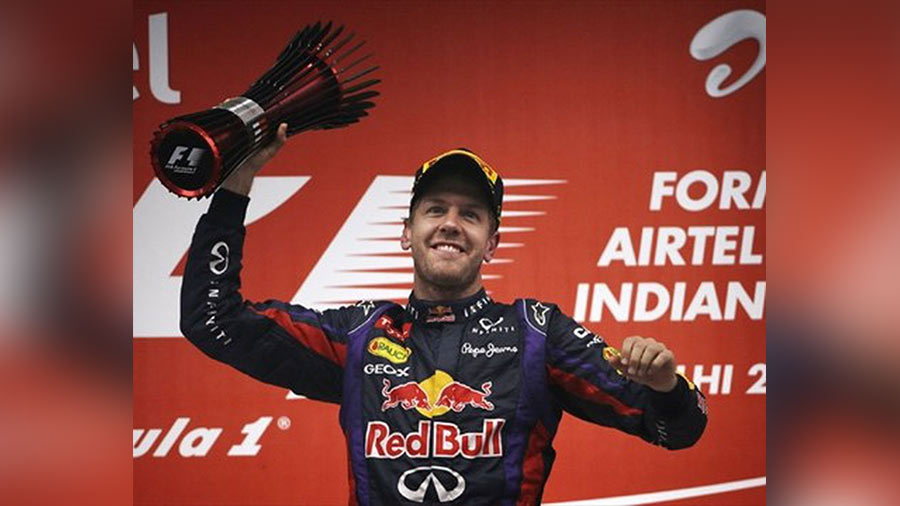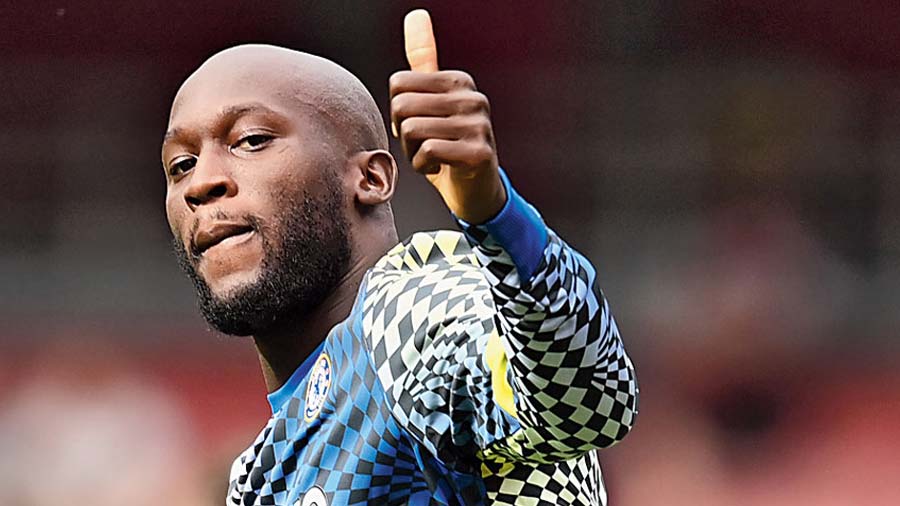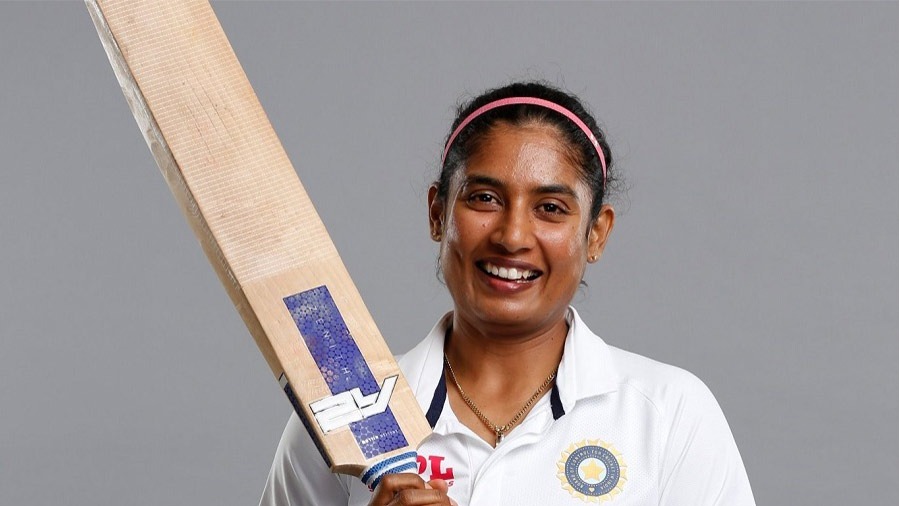July 28 was one of those days that sent shockwaves through Formula 1. As four-time world champion and current Aston Martin driver Sebastian Vettel’s Instagram account started blowing up with a million followers in no time, I knew something was coming and it wasn’t going to be good. About an hour after he announced himself to the world of social media, Vettel uploaded a video announcing his retirement from the sport he loved (at the end of the 2022 season) and one that I had come to love through him.
Growing up in a boarding school, I wasn’t able to watch much of F1, but I’d keep up with the help of the Monday morning newspapers, which, more often than not, featured a picture of a young German bloke standing atop the centre step of the podium with his right index finger raised skyward. It intrigued me because I knew that there were more experienced drivers in F1— Michael Schumacher to Kimi Raikkonen to Fernand Alonso, to name a few. But Vettel had an aura, boyish and bullish in the same breath.
Youngest drivers’ champion in F1 history and leading the Red Bull era
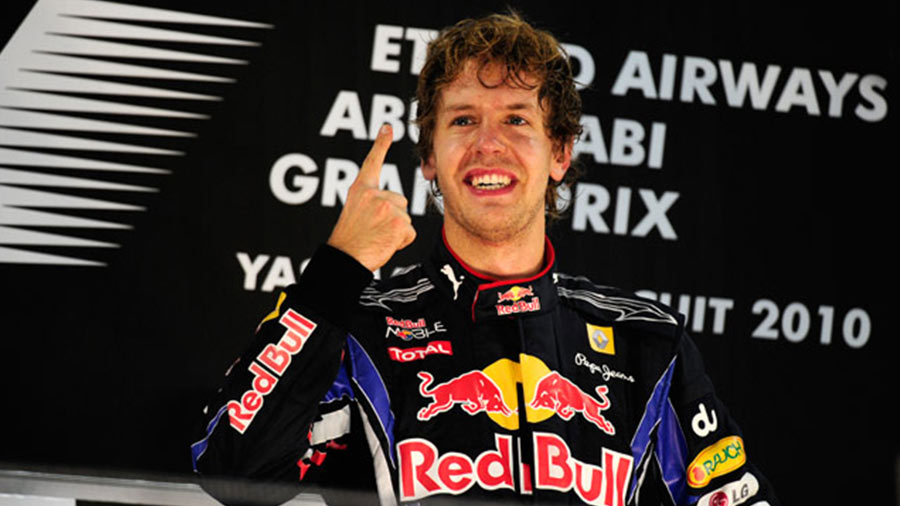
At Red Bull, Vettel won four drivers’ championships on the trot between 2010 and 2013
After a breakthrough debut season with Toro Rosso in 2007-08, Vettel was fast-tracked to Red Bull Racing in 2009, at a time when the team was trying to carve its niche in a field dominated by powerhouses like Ferrari and McLaren. Aged 22, Vettel led the drivers’ championship just once in the 2010 season, but the timing was perfect: his lead came after a pulsating season finale in Abu Dhabi that saw him crowned the youngest drivers’ champion in F1 history.
From then on, Vettel dominated the sport like few others, winning the next three titles as well. It was under him that the Red Bull era took off despite persistent criticism directed at his blunt interviews and petulance.
A fresh start at Ferrari and an image makeover
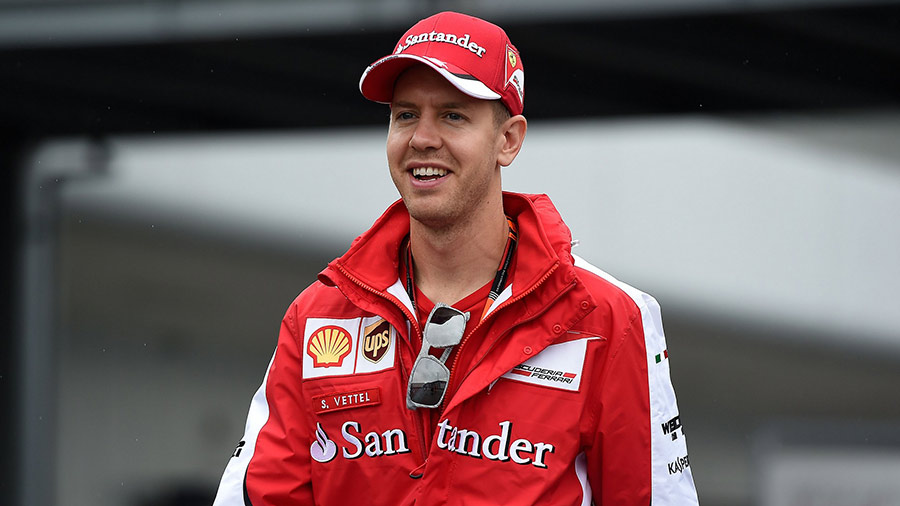
The wins dried up at Ferrari, but Vettel matured and became more responsible as an ambassador of the sport
But as happens in any sport, enduring success was merely a pipedream. In 2014, Vettel was outscored by his teammate Daniel Ricciardo. After a fifth-placed finish on the drivers’ standings, it was time for Vettel to turn over a new leaf at Ferrari, the place where his role model Schumacher had set the gold standard for F1 domination earlier in the century.
Vettel replaced arch-rival Alonso at Ferrari, where he spent six years, winning 14 races. In the process, Vettel matured and became more responsible with his words, if not with his celebrations — customary donuts were complemented by his idiosyncratic Pharaoh dance at every opportunity. Speaking up for fellow drivers and not dodging complicated questions about the status and environmental responsibility of F1 became a Vettel trademark, going against the diplomatic line toed by most of his peers.
An indifferent stint at Aston Martin
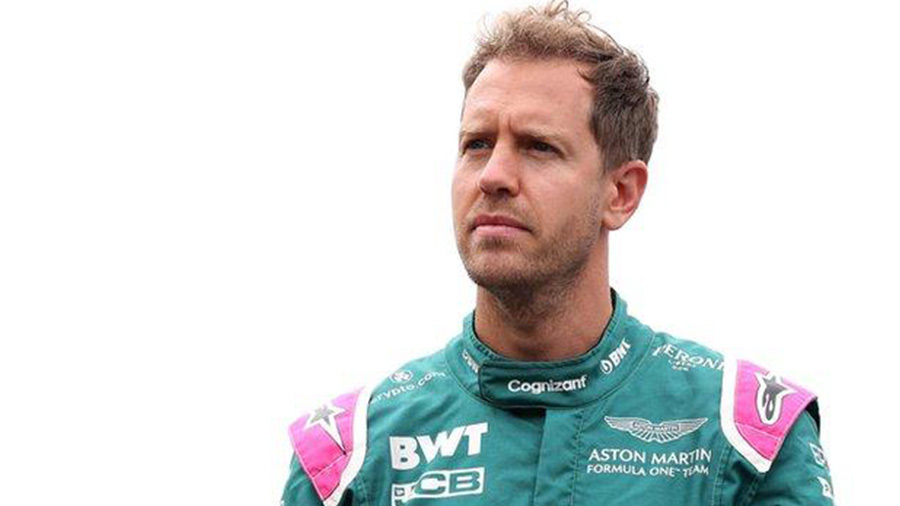
Vettel’s time at Aston Martin has been disappointing so far
As the pandemic brought racing to a halt in early 2020, Vettel’s career at Ferrari also ended for good. In what turned out to be his final move in F1, Vettel joined Aston Martin. He delivered strong performances in 2021 in the form of a third-place finish in Baku and another podium finish in Hungary, which did not count because his car did not have enough fuel left to sample post-race.
While the Aston Martin car looked decent last year, it has taken several steps back in 2022, with Vettel’s frustrations there for all to see during qualifying every Saturday. As a long-time Seb fan, it hurts to see him in a car that is so far off. But it’ll hurt far more to not see him on the grid at all next year. I was confident that at 35, Vettel had at least a couple of years left in him, maybe a handful of race wins, too. Not to be, however.
F1 will miss Vettel and all that he stands for
In his retirement announcement video, Vettel said he wants to spend more time with his family. There was also more than a passing hint that being knee-deep in a sport that aggravates climate change while advocating measures against global warming is moral ambivalence Vettel can no longer be okay with. Then, of course, there is the competitive animal in Vettel that realises that his current team is not good enough and that his time at the pinnacle has passed. In what remains of his F1 journey, all I can expect from Vettel is the sustenance of energy and adrenaline, compassion and care both on and off the track, qualities that have made him an idol to many, including one Mick Schumacher.
With 53 wins and 122 podiums (hopefully still subject to change), Vettel will end his career as the third-most successful driver in terms of race wins, behind Schumacher senior and Lewis Hamilton. Formula 1 will miss Vettel and all that he stands for. He was one of the few who loved everything about the sport and yet, was never blind to its pitfalls.
As Vettel edges towards his final chequered flag, My Kolkata celebrates his five greatest races.
Monza 2008
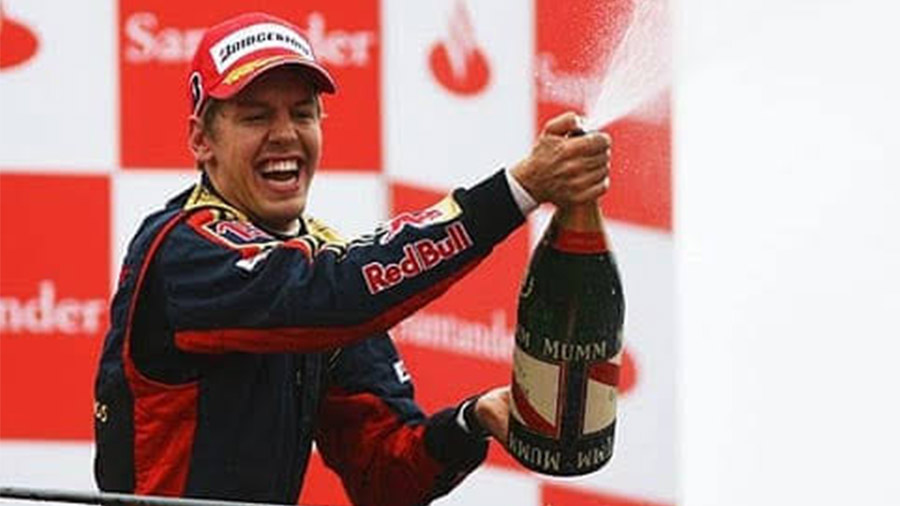
Vettel after his breakthrough win at Monza in 2008
The 2008 Italian Grand Prix was a rainy weekend with a wet qualifying and race day. Vettel put a Toro Rosso car on pole during Saturday’s qualifying, earning the junior Red Bull team their first pole ahead of their sister team. The Sunday after would go down in history, with Vettel leading from the start as the safety car drew away from the pack and thanks to some brilliant wet weather driving, the 20-year-old became the then youngest race winner in F1.
Interlagos 2012
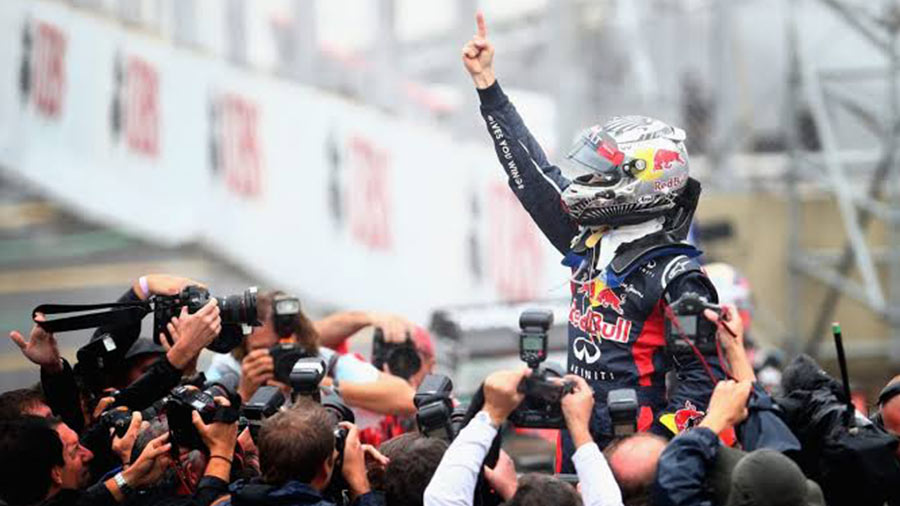
Vettel prevails in the Brazilian Grand Prix in 2012
The last race of the 2012 season, the Brazilian Grand Prix, was not short of entertainment. With the title on the line, Vettel started in fourth but ended up being spun around after contact with Bruno Senna on the opening lap. Down at the end of the pack on the first lap, Vettel had a humongous task ahead of him to win his third driver’s title. Vettel rose up to sixth before the rain-affected race ended behind the safety car, which was enough to give him his third consecutive driver’s title, thanks to a three-point lead over Alonso.
India 2013
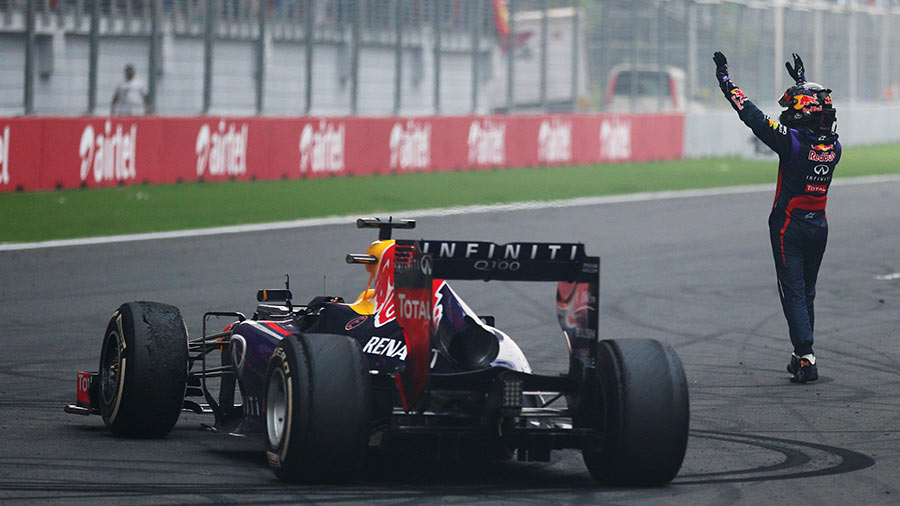
Vettel after bagging victory in the 2013 Indian Grand Prix
The Buddh International Circuit at the 2013 Indian Grand Prix witnessed a bizarre strategy from Vettel, who started the race on pole but chose to pit on the second lap itself, ending up 17th when he came out. From there, the German somehow managed a meteoric ascent to the head of the grid, eventually clinching the race as well as his fourth drivers’ championship. He celebrated with donuts in front of the grand stand as he confirmed his title with three races to go. The 2013 season was the peak of Vettel’s domination. He won 13 of the 19 races that year, equalling Schumacher’s tally for most race wins in a single season.
Sepang 2015
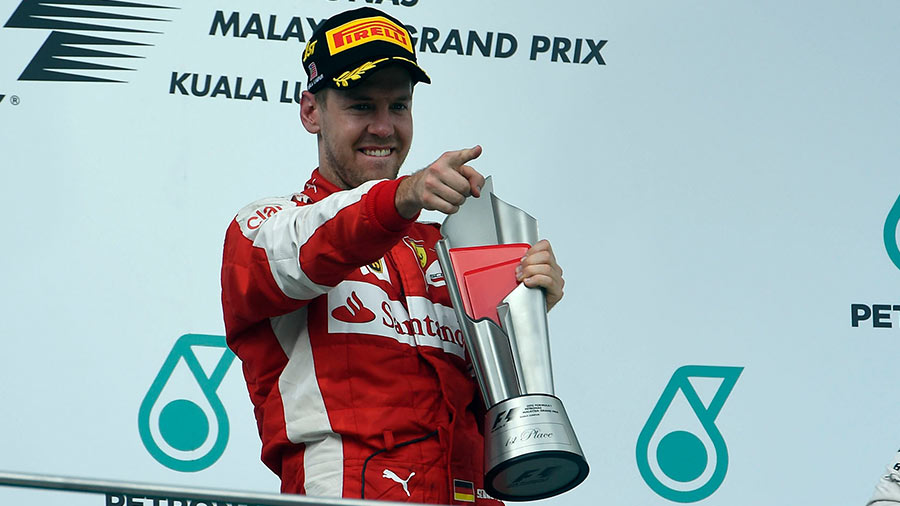
Vettel enjoying his first podium and victory for Ferrari in the 2015 Malaysian Grand Prix
The Malaysian Grand Prix in 2015 was Vettel’s second race in the scarlet red of Ferrari and his first win with the legendary team. Vettel’s victory brought to an end a two-year drought where Ferrari failed to win a Grand Prix since Alonso had last won in Spain in 2013. Vettel ended a rain-delayed Saturday qualifying with the second-best time. In the race itself, Vettel kept pace with Hamilton and gained the all-important advantage with the help of an undercut during the final round of pit stops. Hamilton chased Vettel to the very end but the German kept the Brit at bay as he took the chequered flag for the 40th race win of his career.
Hockenheim 2019
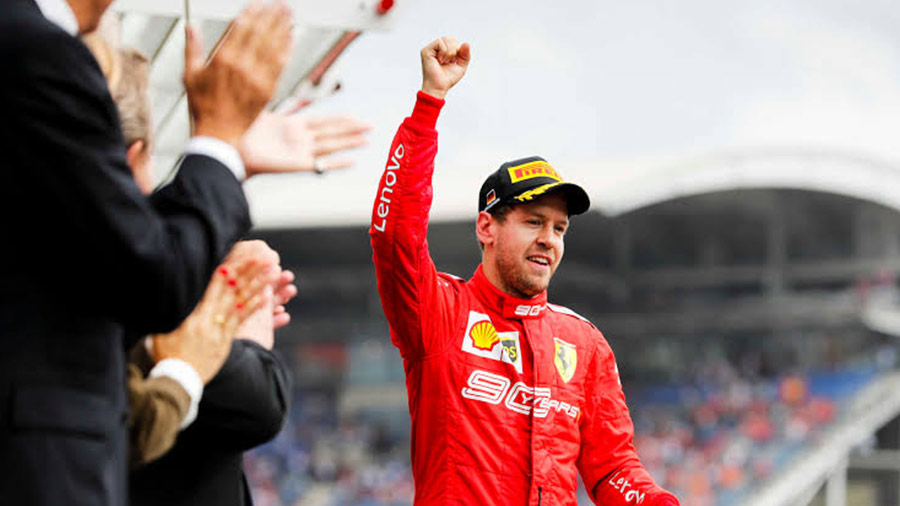
Vettel after a stupendous performance for Ferrari in the German Grand Prix in 2019
Mercedes-Benz celebrated 125 years in motorsports with the 2019 German Grand Prix, which marked the last time Hockenheim was on the Formula One calendar. It also happened to be Vettel’s last home Grand Prix, on a track that was near Heppenheim, the place where he grew up. Starting last due to a 10-place grid penalty, this race was one where Vettel showed the depths of his race craft. A rain-affected race that saw Vettel make light work of overtaking at the start, jumping from 20th to 14th on the first lap itself, ended with 13 cars. Vettel, however, had made it through all the carnage and chaos, to finish second, behind Max Verstappen, bidding his hometown adieu in style. The crowd roared louder than ever with every move Vettel made in his Ferrari and his composure and experience paid off in what has to be one of his greatest drives ever.
